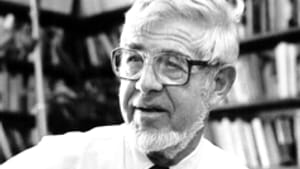Stay in the Loop
BSR publishes on a weekly schedule, with an email newsletter every Wednesday and Thursday morning. There’s no paywall, and subscribing is always free.
An academic envisions a future he won't see
Herbert Gans imagines America in 2033

One of the unexpected pleasures of octogenarianship is discovering the final triumphs of one you knew at the beginning of his career. Herbert J. Gans was born in 1927, in Germany. Like me, in Battle Creek. And we both landed at Penn the year our academic lives took off: 1957— I as a Carnegie Post Doctoral Fellow in American Studies, to create a pioneer humanities course on “The Mass Society,” and Herb as the mentee of that great urbanist, Martin Meyerson (1922-2007), to whom Herb dedicates his latest book (his 12th!), Imagining America in 2033. Not only did our new academic agendas on mass culture overlap— he as a sociologist, I as an Americanist— but Herb lived in Levittown, N.J., and I in Levittown, Pa. His main man was Meyerson, Penn’s president in the ’70s, whom Gans praises in his dedication as one “who first encouraged me to think creatively about the future.”
Just so was Gilbert Seldes my mind-bending inspiration, and whom I nominated then as the first dean of Penn’s Annenberg School. Seldes inspired me to help create the humanistic study of mass culture. Gans, throughout his career at Columbia, kept clarifying America’s hidden class system as it affected city planning, information media and mass education.
Out of Bush’s ashes
As its title suggests, this book is an imagined history of the first third of the 21st Century. It begins, in a novel way, as a utopian fiction in the tradition of Edward Bellamy’s Looking Backward: 2000-1887 and ends as a series of clearly stated position papers on the issues that made George W. Bush’s presidency such a tragic American aberration. Gans confesses he was moved by Bellamy in high school (he fled Nazi Germany at age 14). In graduate school he began to think about writing a “realistic utopia…. in which credible people, grappling with standard economic and political obstacles, were creating a better future.” Gans’s first two books, The Urban Villagers and The Levittowners, contended that these working-class milieus were not the stereotyped parodies that snooty Upper West Side New York eggheads made them out to be.
Incidentally, my commitment as a humanist to a canon of past texts was anathema to the sociologist in Herb. He talked rather of “taste cultures”— plural— dealing with particularities of a sociological subset. Herb's pluralism echoes the black folk aphorism,"Different strokes for different folks."
Focus on the future
I had been drifting to this pluralism as I cross-examined my own teaching both in high school, college and research university. It’s why I finally devised “International English,” an open-ended humanism oriented toward the future rather than the past. If the Old Regime prized the best that had been thought and said, International English scans the horizon for future literary options, in the works of, say, the Irish poet Seamus Heaney, the Nigerian playwright Wole Soyinka and the South African novelist Nadine Gordimer. My future-centered humanism became solidly based on Herb Gans’s multifaceted singularities.
The action in Imagining America in 2033 begins the night before the inauguration of President-elect Stephen Hernandez. The real action begins in his historical fantasy when “the seculars” take over. In Gans’s future, the once powerful religious-business alliance is ancient history— Protestants, Catholics, Jews and even Muslim conservatives having become so disgusted with professional politicians that they have returned to their churches, synagogues and mosques. Gans describes a new economy comprised of fewer very rich and very poor.
Nurses as doctors
When retail and services begin to dominate the economy, almost everyone finds more government intervention congenial, because it’s necessary. For example, outsourcing makes company health insurance unaffordable, so the government takes over. To relieve hospital jams, nurses become “near M.D.’s.”
On the other hand, the U.S. is no longer the most powerful nation on earth. And the by-then-unaffordable full-blown wars on terror are to be replaced by less expensive intelligence services. The key to his multivalent future is thoughtful adjustments to inevitable change. Gans’s future idealists seek better political representation. Gerrymandering is outlawed. Two senators per state, no matter the population. Big cities get senators as they became states, much like Hamburg, Berlin and Bremen in Germany. America’s so-called Sacred Documents got a respectful once-over. Reason replaces ranting in our political life. The Electoral College is abolished. Election financing goes public. Education is revised to conform to changing job availabilities.
In short, all of our institutions get eagle-eyed to see if they can work more effectively. Gans’s fiction, as these issues are addressed and sometimes solved, is gradually and graciously replaced by out-and-out position papers. The book thus ends as a thoughtful critique of our old institutions in the lights of a new century.
Revolution at MOMA
If you’ve never read a book by Gans before, where have you been in the preceding century? But not to worry: Everything Herb has learned in his six decades of research and policy proposals for the future is here, and it’s never dull. And I’ve got great good news for Herb: The Museum of Modern Art in New York has just abandoned its 80 misleading years of following Philip Johnson’s meretricious fixation that architecture is mainly about art for the critic rather than function for the client. What gives? Columbia University’s star architectural historian, Barry Bergdoll, has just taken over as MOMA’s new boss. A new humanitarianism is on the ascent. Do you suppose Barry was listening to his Columbia colleague Gans?
What, When, Where
Sign up for our newsletter
All of the week's new articles, all in one place. Sign up for the free weekly BSR newsletters, and don't miss a conversation.
 Patrick D. Hazard
Patrick D. Hazard